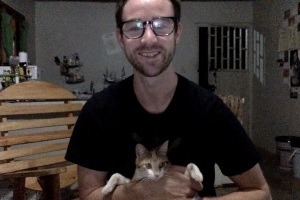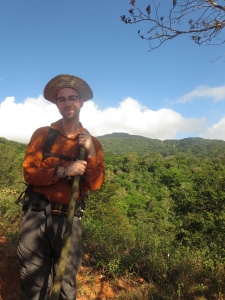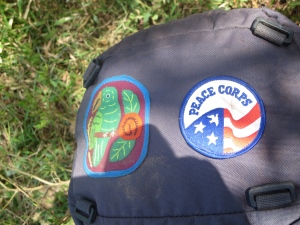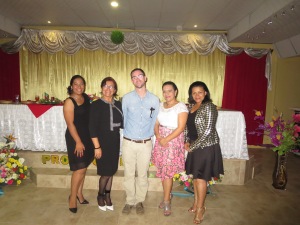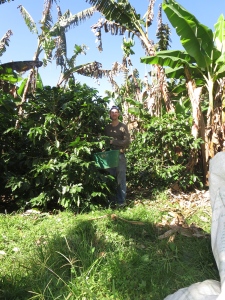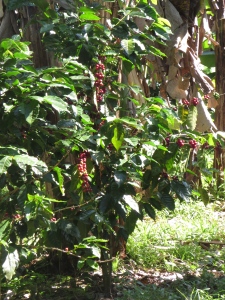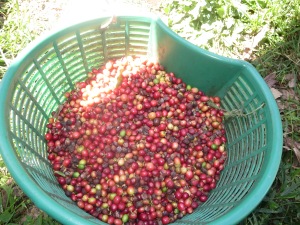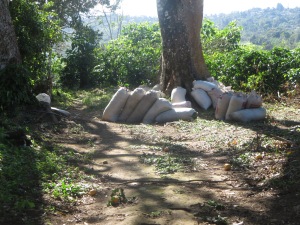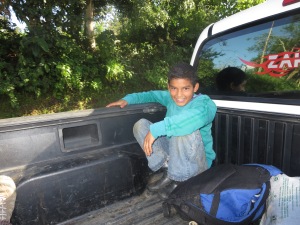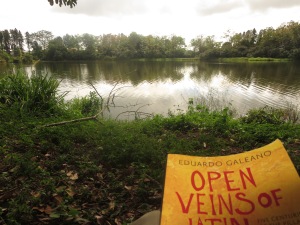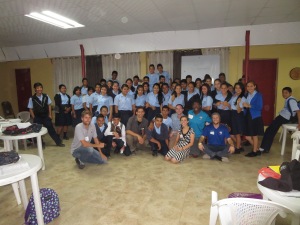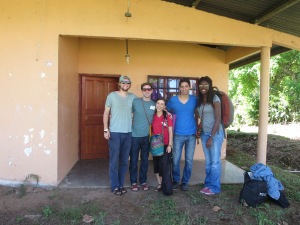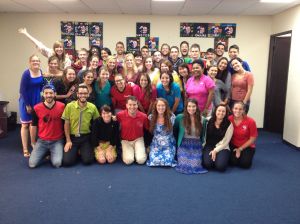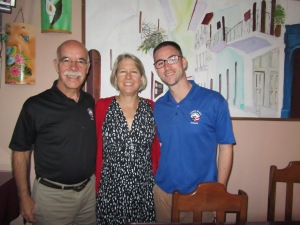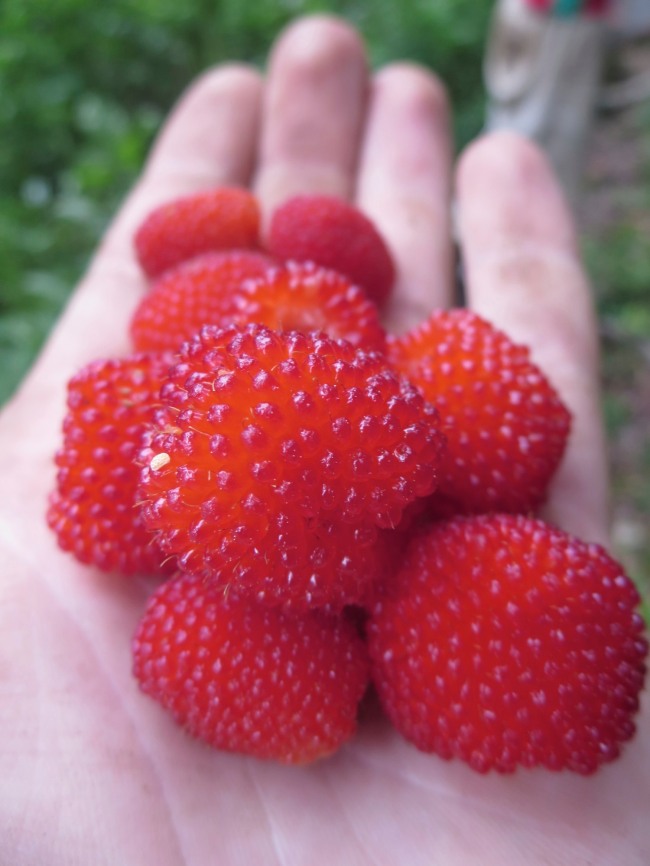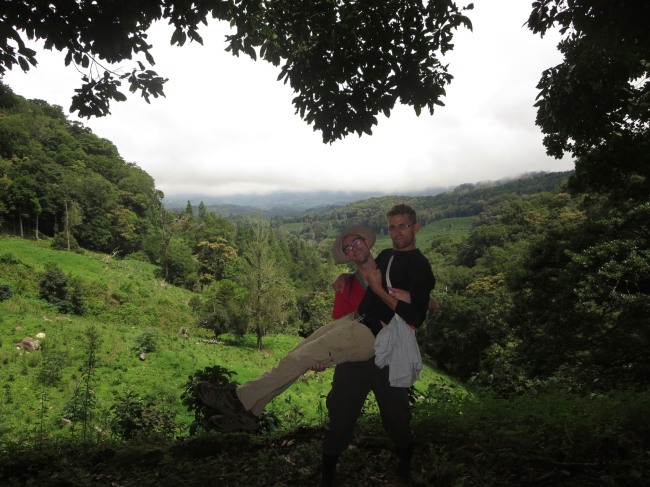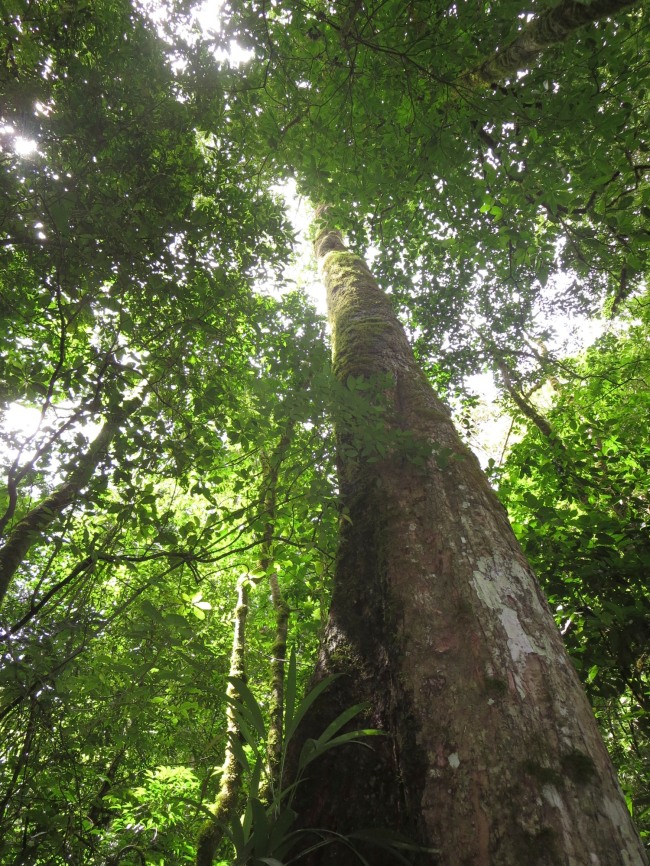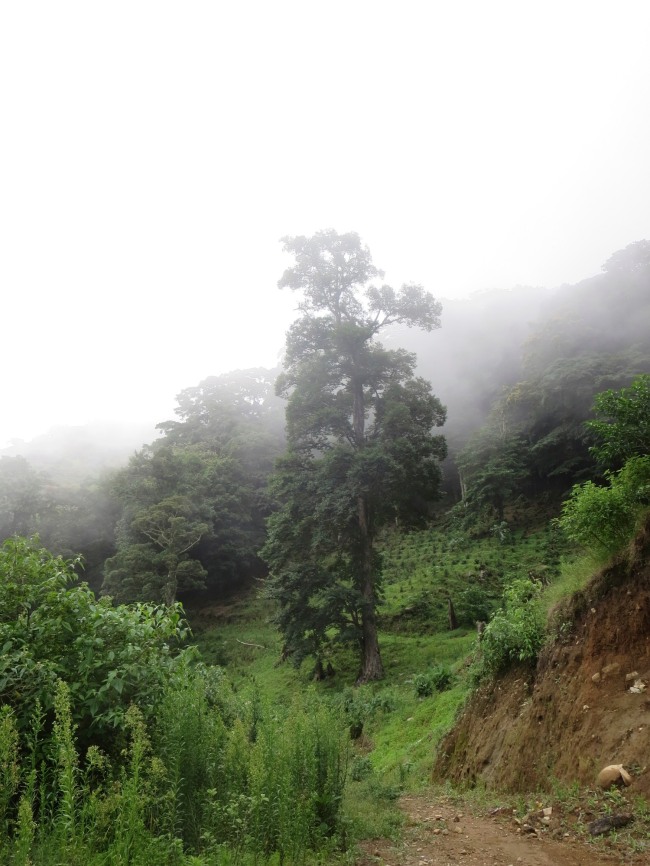The weeks have been passing by terribly quickly of late. Last time I remember looking at a calendar it was December, or January, but not March. Today I paid my last rent in Rio Sereno. I’ve lived in my house for a year and four months, which is longer than I’ve lived in one house for, well, since I was probably 17. To me, that is strange. Summertime, as I said earlier, has been passing by quickly. I’ve spent a lot of time traveling around to different locations in Panama, visiting people and their communities that I’ve said I wanted to do for a long time, I’ve had my fair share of visitors as well. The coffee harvest came and went. We haven’t had a real rainfall for at least two weeks, the winds are blowing, school starts on Monday. My long mornings and endless cups of tea and visits from students and family members seem to be behind me. I’m soon going to be back in the two meals a day and endless coffee routine. Tomorrow I head to the University to continue with my conversation practice that I am doing with about 10 English university kids. It is a lot of fun, but to celebrate the my last day of summer vacation I went to the neighbours and lost about 3 dollars in nickels and dimes playing dominos (the money doesn’t bother me so much, as long as I can take out my anger by slamming down the dominos on the table as hard as I can). Over the last year I’ve become a lot more attached to moments like this one, how the day turned to night and we went from eating spaghetti on top of a plate of rice with little chunks of hot dog and stir fried veggies to having a couple of fermented pineapple juice, slamming down dominos or calling out bingo with glee as we win/lose 35 cents a game. I used to shy away from these experiences, searching for my solitude I would stop by and talk and then go back to be by myself, but the longer I’m here, the more I desire time spent with my community members – not necessarily the children, but the adults, with their deeply connected roots in the community, with their dirty hands that have been working all day in the fields, the individuals with simpler pleasures – a small plot of land, a starch filled dinner, a quick game of dominos at the end of the night and the occasional curse word that goes along with it. I already know the next few weeks are going to travel by quickly and I’m making my list of things I am going to miss and the things I hope to take back with me when the time comes when I have to go.
A short note on Costa Rica and the upcoming weeks
Last week ended my quick little summer of travels – I ended it with a friend and a week long trip to Costa Rica. We left my province, Chiriqui, early in the morning and made it to San Jose, CR in the early evening. Long bus rides and longer lines at border checks – and settled ourselves before heading further north. Basically, we spent a few days traveling through the country trying to get to different National Parks to hike. We ended up summiting two different volcanos, sat in hot water spring-fed rivers, hiked along a beautiful river – Rio Celeste, which is a bright blue color due to a chemical reaction from different minerals in the water, and finished our trip back in San Jose, eating out and having a few beers near the Universidad de Costa Rica. All in all the trip was really fun, albeit a bit expensive (as CR is more touristy than Panama, the prices represent that). It was interesting to see the difference between Panama and Costa Rica – Costa Rica is a little more liberal and open, while Panama tries to fit itself in a lot of cultural norms, but also has this fake, superficial way of dressing and acting (especially in the cities) that we didn’t see as much in Costa Rica, where everything seemed to have more of a sense of individuality, which was a pleasant surprise. Hiking and traveling in CR was a little more difficult though, as the entire system is set up for tourists, and although we were tourists in Costa Rica, as PC volunteers we (a. don’t have the money to pay for guides really) but also are a little more willing to search out information and g out on our own, which is what we tried (and ended up doing) to do, but it was a little difficult, and frustrating. Below are a few pictures of CR.
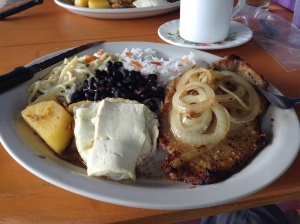
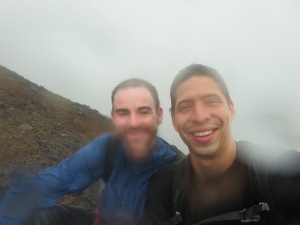
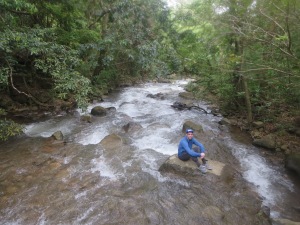
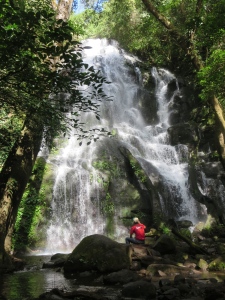
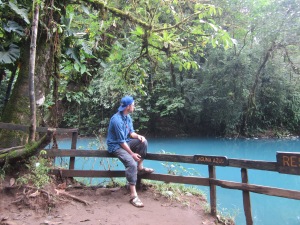
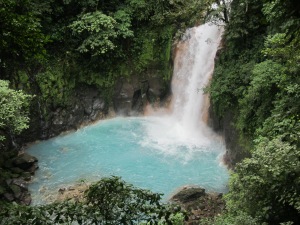
Top left: A traditional “casado” – CR typical plate, top right: a soggy photo on a peak of Volcan Rincon de la Vieja, Middle Row: Photos from Rincon de la Vieja National Park (Guanacaste, CR), Bottom Row: Rio Celeste hike – deep blue pool and the ending waterfall.
Attached below is the final short story I wrote (although I wrote it a long time ago) that I submitted in the La Vaina (volunteer magazine I edited).
It’s called “Growth”
5 July 2013
They was sittin on the sidewalk. What they was doing I can’t say, but I was jus walkin along. Musta been near three a’clock. They was just sittin there. He was shakin his head a lot. They wasnt touchin. They wasnt fightin neither, because when peoples been fightin they always is yellin at each other, but they wasnt doing that. He was talkin now that I think about it, but not her. She looked pale for a white girl. He kept talkin, facin her while she stared somewhere far away. He would lean in towards her and kept trynna hold her hand. They wasnt touchin though. I remember that. I walked up to them. He said somethin in Spanish. I thought they was maybe waitin for somethin, so I went and asked em what they was waitin for, but she just said no and he shrugged n then she took his hand for the first time and told him they was goin home, and home they went, wherever it was, down the street somewhere, back through the darkened streets where they had come. What the hell they was doin there, sittin on the street corner at four in the morning like that I don’t know. Twas strange, those two. A good lookin couple, but what the hell was they doin sittin on the corner like that?
22 July 2013
I looked her direction when I heard her scream. It was short and was barely audible over the sound of the music, and other less frantic screams. I saw her standing in the middle of a darkened street, the light from the distance alighted the back of her head. She was wearing a striped dress and was a little taller than average. Her hands moved at first from her side, then to her mouth, then atop her head. She seemed to be panting. She walked forward slowly, until a man returned to her side. They stayed standing in the middle of the street. They just stayed, I didn’t stop and watch them for long, I was thinking about approaching when it was just her, you know, to see if she needed anything, or was hurt or something, but she had someone, and my dad always used to say three makes a company, so I continued back to the bar, bought a whiskey, and I’ve been somewhere between hungover and sunburned and haven’t thought of them since.
7 July 2013
Tourists are always so clueless, she spoke good spanish, even when I tried to talk to her in English, so maybe they weren’t actually tourists, but they were there, sitting on the sidewalk, being approached by me at three in the morning. She told me her purse had been stolen, she thought I would be able to help or more likely she thought since I’m black either I did it, or I knew who did, which, to be fair, I did know. She looked calm and she looked scared. Her eyes bore into everything she looked at, as if she was really seeing the island for the first time. She saw the dust in the alleyway, she saw the drunks in the distance, and she saw the faces of the men like me, on bicycles and walking slowly on the sidewalks and through dark alley ways. The light poured on her eyes from a distance, and an icy sensation followed her every gaze. She looked as if she understood every small aspect of the world we belong to, yet when her eyes came back to focus, she looked at me and asked me if I could help her again. I told her I would be able to help her, I would take a look, that they should stay put right where they were, that I’d be back in twenty minutes. I swung the other direction, biked down the block, pulled over and pulled out a cigarette and lit it. I was drunk and burned my lower lip. I knew who stole her purse before it was even stolen. I never went back, they were of no use to me, but I still think about those eyes, what was she thinking when she gazed out past me, when it was so clear she understood everything that had happened to her and what she would do, yet when she turned back, and her eyes faced me, she was only able to utter a plea for help that she had to have known I wouldn’t answer.
6 July 2013
Some purses are easier than others. Some girls strap them across their chests, some wear them over one shoulder, some are made of leather and have little metal clasps. Some purses are made of cloth and are completely stitched together, while other girls sometimes don’t even have purses, they’ve got those little wallet purses they carry on their wrist. I have different strategies for all of them. I have quite a history with purses of all varieties and tourists of all nationalities. I don’t know how many times I’ve stolen a purse, it’s not glorious and I’m not here to brag, but I’m here to say, it’s how I survive, and I’m good because I have to be. So yeah, I stole that girls purse. It had eighty dollars in it and a cell phone. So what’s not to like? I didn’t do her any harm, if anything she should thank me, next time she won’t be walking around in dark alleys with some guy she probably didn’t even know in the first place. All walking and holding hands and laughing at each other and embracing between steps. Ain’t time for that shit in the middle of the street. I should have stolen her purse and stopped them and lectured them both for acting foolish. If I had another chance I’d do that. Instead, I took her eighty dollars and the next day I got thirty-five from another gringa, and tomorrow I’ll hope to get something else from some other tourist, walking around like they’re all safe and that they own the goddamn island. Like it’s made for them or something. I’m from here. I grew up on this island. So why are you here trying to make me feel guilty, huh? Ya’ll come here and don’t give me anything, so know what? Go back to where you came from and kiss each other on ya’lls own streets.
5 August 2013
Back in those days it was unexpected, what he was doing, running around chasing after her throughout the bar. Everybody had gotten used to it soon after. Well, everyone except her. He kept going up to her and kind of pushing her away. He was doing it because he thought it attracted her more, I think. It didn’t work. I remember she was standing with her back against the wall a lot of the time. Her cheeks were a soft pink enhanced by the pulsing light. I don’t know if it was because she was drinking or was embarrassed. I would assume it was both. Anyway, he kept going up to her, laughing, and then turning his back and walking away from her. When she didn’t follow him he ended up coming back to her, and five minutes later he would wave his finger at her and walk away again. I don’t know what he was doing. He was jealous, or he was in love, maybe both. Is there really much of a difference? Anyway, I got sick of watching it, so I left and bought a hamburger with cheese from a street stand a block or two from the bar. I walked in a lighted street the entire way. I wasn’t trying to be safe, I just wasn’t being stupid. I made it home and found the two of them in opposite sides of the same bed, and when I asked how their night ended I was told her purse had been stolen. I don’t remember much of the rest of the night. I went to my room and before I fell asleep I wondered how the two of them ended up in the same bed, and how everything was so obvious for everyone to see except him. He no doubt was in bed, with his eyes open, staring at the ceiling just like I was, thinking how despite the purse snatching, he had done everything right, and that tomorrow would be the day that she would love him back. Poor kid, he never knew he never had a chance in the first place. Or come to think about it, maybe he did, and what he was chasing after wasn’t her at all, but the idea of love, or the idea he was desirable, or the ghost of a person he saw in her, or maybe he was just in love and he wanted her to feel it back.
14 July 2013
I had a day that stealthily turned into a night before I even knew how to control it. We went to dinner and after I swam in the darkened waters as others discussed if we shared those same waters with sharks. I felt watched, like every word out of my mouth was being scrutinized, that every attempted conversation couldn’t take more than three small steps. So I drank, knowing it would help, because it had solved this problem many times before. We walked across the island to the bar and I made sure to make the impression that my speech and steps were strong and stable. My cheeks weren’t flushed with pink. I was golden.
But that feeling never lasts. I went from awkwardly standing in the middle of the dance floor to sitting on a wooden dock, feet dangling in the water, back to the dance floor. Once there I began to dance, first with no one, next with the girls and after with one tourist or another. You know how it is when you’re at a club. I wasn’t interested in any of them, but I wasn’t uninterested either. Then he finally stood up and left the dock and inevitably came to dance with me. I wouldn’t necessarily call it dancing, instead it was something between lower waist gyrations and running, twirling his wrists repeatedly. He always smiled. He waved his finger at me and he came and left, but I could tell, to him, I was the only girl there. We’d known each other. We wrote letters to each other. There were feelings, but I never knew how real they were. Did I have feelings because he was always here and I sometimes needed someone to talk to? Were they there because he lived near me? Were they there because he had feelings for me and I didn’t want to hurt him? Were they real after all? All of these questions swirled through my head, as they did every time the two of us were in the same place. His eyes, only for me.
Whether I fell for them, I wanted to all along or because I had been drinking, we walked home together. He grabbed my hand and held on to it tightly. He squeezed my hand quickly twice, and said something about feelings and an anecdote about what quickly squeezing a hand twice had meant to him as a child. I didn’t say anything, and instead we fumbled our way through the streets. We walked up a dark alley, I pointed to the lighted street ahead to acknowledge our destination and as he pulled me towards him a man ripped my purse off of my shoulders and began sprinting down the dark street. He followed the man around a dark corner and for a moment I was left alone in the middle of the street, wondering what had just happened.
I woke up the next day, walked by myself on the sun soaked streets and alleys of the robbery just hours before and pretended everything was fine. I pretended that life could go on as normal, that I would get a new debit card and a new phone, that I would write letters and we wouldn’t change. But we do change, nothing stays the same, and ever since then, we’ve grown apart.
Parque Nacional Cerro Hoya
This past week I traveled to the southern peninsula of Panama (called the Azuero Peninsula) to take a trek through low deforested plains, summit cloud forest mountains (Cerro Hoya) spot monkeys, toucans, macaws and even search for elusive jaguars.
The focus of our trip was two-fold. First, a former Peace Corps Volunteer is studying jaguars in this national park and their mating habits, so we were put together to carry cameras and place them in specific places so she could study their travel habits (unfortunately the cameras never arrived so we never carried them and never placed them, a few people are going back to Cerro Hoya next week to do that). The second portion was to help continue training the main guide that will hopefully lead some of the small pueblos surrounding the national park on how to effectively guide and work with tourists (as a major project in some small towns outside of the national park is eco-tourism).
So that is how we started and what we were doing. There ended up being 16 volunteers and one guide on the hike, which is a lot of people, too many probably, but that’s beyond the point now. We traveled to a small town called El Cortezo, Los Santos and spent the night, dividing food, talking about the hike and the risks of the hike.
The risks (we knew about):
1. Jaguars – I mean, jaguars are big scary animals that are straight up predators and pretty much own the jungle, so walking around trying to walk where jaguars walk is pretty dangerous.
2. Africanized bees – You’ve heard the scary stories about packs of wild bees that attack your orifices until you can’t breathe. yeah, that’s these bees.
3. Snakes – Snakes exist in jungles, so snake exist.
Day One:
We hiked out of El Cortezo, we left the house a little after 6 am and basically hiked up hill under a (luckily for us) cloudy sky. We climbed and arrived to the base of the national park at around noon – six hours of some of the most strenuous uphills (but we had three horses carrying a lot of our stuff). It was a short day though, which was nice. We hiked to a small little farm at the base of the national park called Joberito. We spent the night at Joberito, the wind whipped, random cows and pigs rummaged around near our tents early in early morning hours. We woke up early, knowing the following day we would enter the national park, and meaning we would see some very beautiful jungle habitats, enter the domain of the jaguars and the natural environment which we figured out was a lot more dangerous than just bees and snakes.
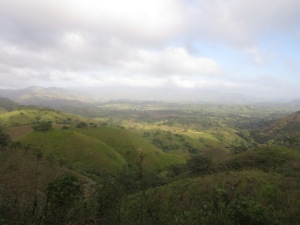
This is a lot of what our first day of hiking looked like, leading up to the national park.
Day Two:
Day two we left from Joberito and worked our way into the national park. Again, we started pretty early, waking up a little after four am and getting on the road around six. We hiked for nearly ten hours this day, we arrived to our camp “Panther camp” – an area where jaguars had been sited in years past. we finished the rest of the climbing early this morning, so this day was basically spent walking along ridge lines, making new trails that will be used in future years and hikes to come. We arrived in camp with ample time to bathe, cook and set up before darkness crept up to us. The fires were made, food was being prepared and tents set up as the wind continued to whip as it had in days past (and for continuing days). Quietly at first we heard what seemed to be breaking branches but soon realised the problem was much worse. A tree at least one hundred feet tall and three-four feet wide was falling over, crashing towards the ground, and not towards our camp, but towards the river where three people were bathing. It’s hard to say what really happened next, some people screamed, the husband of one woman at the river sprinted down, one lone voice screamed. Apparently the three below had heard the tree coming and were either able to jump out of the way of falling branches or quickly dodge to the river bank and out of harms way, they were left with small cuts from some branches that fell on top of them, from diving into a very shallow river bed, but more than that, they (as well of the rest of us) were really shaken up. Never had we expected that something like this could happen, and knowing how close of the three of them were to real death, it was a little more nerve-wrecking. I don’t want to seem over or melodramatic, but to say that none of us slept well until we were under the stars on the beach, nearly three days later, without trees swaying back and forth overhead. I can still remember, clearly, and may never forget, the collective sigh when from that riverbank we heard one fellow volunteer say, “We’re fine.” Those words, they could have been something so different, and just a matter of feet, sometimes, is the difference between life and death.
Day Three:
The next day we woke up, still a little shaken up, still a little nervous to talk about wind and trees and we headed towards the summit of Cerro Hoya, I can’t remember the elevation, but it was chilly and it was full of moss growing on plants that were growing on other plants. We walked through small fields of orchids, and we ended up reaching the summit in time for lunch but had to continue because we spent a lot of time on the summit as well as looking at capuchin monkeys that we encountered on the trail. In the afternoon we began the gruelling downhill. Basically the trail was straight down hill with large rocks as foot holds (that also occasionally went sliding down towards our fellow hikers). Howls this time came in the sound of volunteers screaming “Rock!” instead of the howler monkeys we had heard in previous days. With about one hour left of our hike, our guide spotted a spotted jaguar, he said it was staring at the him/the group before showing its teeth and going the other direction. We had been following jaguars for days, seeing tracks and scat multiple times each day. Our guide, Mingo, had told us we probably wouldn’t see any jaguars, but they would definitely see us. So for an hour, he made off the collar comments about the jaguar most likely tracking us and how we needed to travel in small groups for bathroom breaks. It was hard to tell if he was joking or nervously talking, I’m assuming it was his nerves. It was a serene day of hiking, we were nervous and on edge and after sliding down mountain hills we were ready for a break. We arrived at a place sufficient to sleep, after inspecting trees (and being paranoid about them), we drank a little more of the fermented sugar cane (seco) and rum we made room for in our backs – sometimes if you are going to survive a night of wind and looming cougar doom, you need a drink or two to ease your mind.
Day Four:
The final day of the hike we continued downhill, although it seemed the most difficult downhill was behind us, from there we crossed rivers multiple times as we came closer and closer to the beach town – Cobechon – in which we were going to spend the night. The hiking ended up being nearly 8 hours, but we took a very leisure pace, as our bodies were really suffering from the weight and from the scrambling up and down unsolidified trails. (This photo is one of the last views of the Cerro Hoya which we summited the day before, as we were exiting the park.)
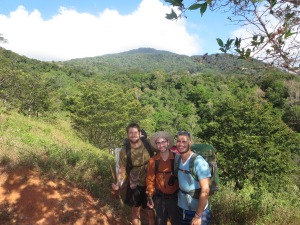
We exited the park, and actually outside of the park we saw some of the most spectacular wildlife of the entire trip (it is the dry season, so a lot of animals but specifically birds were in the lower ground with closer access to water). Here we saw the Azuero Parakeet, toucans and two green macaws (which are very rare in panama).
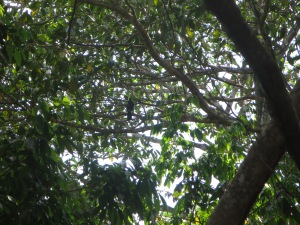 In the centre of the photo is the toucan seen just after viewing the green macaws.
In the centre of the photo is the toucan seen just after viewing the green macaws.
This photo is a little harder to see, but there are two green macaws, their bodies are basically entirely green and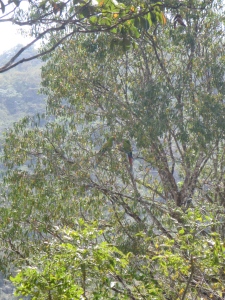 their necks, heads and tails consist of red and blue. They were truly beautiful birds, we would catch up to them on the trail and they would feed and peck at each other (macaws mate with one partner for life) and then would swoop out of the tree and watching their outstretched bodies sail, almost without flapping their wings, to the next spot to sit, relax and eat was truly unbelievable. What beautiful animals.
their necks, heads and tails consist of red and blue. They were truly beautiful birds, we would catch up to them on the trail and they would feed and peck at each other (macaws mate with one partner for life) and then would swoop out of the tree and watching their outstretched bodies sail, almost without flapping their wings, to the next spot to sit, relax and eat was truly unbelievable. What beautiful animals.
We camped in a small little town (not even a town just four houses on the beach) called Cobechon, the following morning we would take an hour boat ride to a small surfing village called Cambutal. This is the sunset view from Cobechon, a small and very tranquil visit, yet unfortunately without beer on our day of arrival (ugh.)
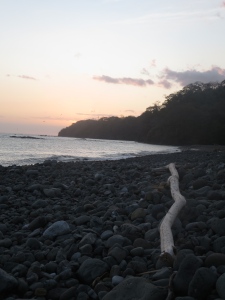
The next morning two boats showed up at eight am to take us to Cambutal, the surfing village we were going to stay in. We ended up staying at a research sea turtle station about 45 minute walk out of cambutal, it was utterly beautiful, crystal blue water, waves pounding down on the shore and a view that seemed to go on forever. We had lunch and beers in the community and continued our celebration of finishing, surviving and not having to carry anymore bags of rice or oil in our backpacks for the entirety of the evening, finishing laying out at night, watching shooting stars and hearing the waves crash on the beach. Here is a picture of a few friends and myself on the boat ride along the southern Azuero Peninsula coast, heading towards Cambutal.
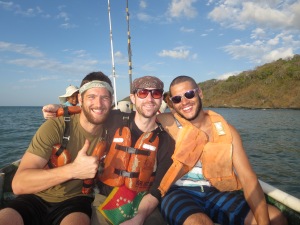
It was truly a really, really awesome hike. At a lot of points we felt really remote and not ever did I feel we were in control, but instead the natural environment. Now I’m back, but not for long, I’ve got some work in site to do and then I will head off for another quick vacation to Costa Rica for about a week, rambling around, looking for kind old women to take us in, and to see not what the tourists see, but to fumble around in the dense jungles, to force nothing, but to let it all, slowly, come my way.
Beginning of Summer
I have returned to my community, a community filled with holiday spirits, there are icicle lights on houses and midnight on the 24th of December the community filled with fireworks (not the pretty brilliant looking fireworks, just the ones that pop as if they were a gun shot.) On the second day after my return from Panama City I went to my high school to see the graduation of the senior class. The senior class was around 120 students, I worked with about 85 of them frequently and was especially close to twenty of which I worked with in an English club. For maybe the first time in two years when I was told the graduation started at four, it actually started at four, and besides a little overly long winded speech by a member of the Ministry of Education, the ceremony went by quickly (just about an hour). After the ceremony I was invited to a dinner with the representative and mayor of the district, top students, professors and other invited guests. It, as is always the case of fancy meals, super delicious. Below is a photo of me and a few of my English professors, Maury, Lely, Tatiana and Sandra (from left to right) at the after graduation dinner.
We’re pretty good looking, I think.
After graduation holiday season began. In Panama we celebrate the evening of the 24th and then the 25th itself is more of a leftover, sit on the couch, have a couple beers and be lazy kind of day. I had a fellow volunteer join me on the 24th and we had dinner at my host family’s house (delicious ham, chicken and rice with raisins in it) and then we returned to my house to have a few cocktails to wind down the evening, until the array of firecrackers and low flying fireworks woke up the entire pueblo from 11.30 to nearly 1.30. Christmas I walked around town, visiting the community members I was unable to visit the day before. I ate an embarrassingly large quantity of calories, always making jokes that december is for eating and january is for exercising. The 25th itself was full of homemade ron ponche (which is a panamanian variety of eggnog), the cheapest beer (Panama Light) with freshly squeezed lime juice, left over ham, fried chicken and tamales (http://en.wikipedia.org/wiki/Tamale) left me rolling from one house to the next. I made it home around 6 pm and was in bed soon after (a man can only do so much with a full stomach).
In the last few days I have been spending more time outside of my house and no time in the school and therefore have had a lot of time to go for long walks in the community and have started harvesting coffee near my community with my neighbours. My neighbour, Olmedo, oversees about 25 indigenous workers that are harvesting coffee in a 20 hectare coffee farm and three or four days of the week his wife, daughter and son go and pick coffee to make a little extra money. Indigenous families as well pick coffee with the entire family – the father is employed and every family member picks coffee if they are over the age of 5. Now, picking coffee is not easy. Coffee grows on steep slopes and is usually not shaded, but is planted underneath plantain trees. We left the house at 6 am, arriving and starting to pick at 6.30, stoping for a food break at about 11.30-12 noon and then continuing until 3.45 pm. Only red coffee cherries are harvested and they are harvested into a plastic basket that is attached to your waist. At the end of the day, all of the coffee collected is placed into large burlap-esque bags and measured out by lata (basically a large measuring device, lata means can). A lata of cafe is about 28 lbs and in the span of the day I picked three latas. The owner of the farm pays each worker $2 per lata and then takes all of the coffee to the receiving dock for Duran Coffee (which is the largest coffee company in Panama) and receives $6 per lata. On the day, the four of us in total picked 10 latas of coffee beans, making 20 dollars for the our 9 and a half hours of work. This is how the indigenous workers in my community work and live (and they travel from far away for the opportunity to pick coffee in the coffee growing regions every year – I was picking with a family that came from 14 hours away). It was a long day, the hot sun burning down on my head, searching for water, wishing I had a little more food and didn’t see an occasional snake, but more importantly, it was really important for me to see the livelihood of the Ngobe families that came to my community in order to make a little more money in the back breaking work. Owners vs workers, out in the open, a system directly in place to get the most out of those with little, separating us from each other with each harvest. Below are some pictures of the day in the finca.
I’ve been reading a lot, now that I have a little more time on my hands (I always made time, but now “making time” is a little easier to do). I run on an old military airport which has been transitioned to a dirt road lined with different varieties of beans grown by the Ministry of Agriculture, a few weeks ago I was walking with a friend and we found ourselves seated next to one of the lakes that lines the old airport road, this is where I now do my reading, below is a photo, but on the clearer days, you can see the entire Talamanca mountain range the tail end holding Panama’s Volcano – Volcan Baru.
Merry days ahead to all of you. xx
As I sit, over caffeinated, pondering the end.
Since I returned from the United States (early November) it seems I’ve been sliding down an icy Wisconsin sidewalk, all systems go, focused only on the highlight reel that seems to be my life. I’ve had little time to be by myself and decompress, which isn’t bad, it just is.
Upon returning from the States I organized (I’d “organized” or at least tried to for at least a month before departure to the states) a seminar for my entire 9th grade (116 students). After four separate meetings explaining what I would be presenting, who I would invite to present, why the topic is important, I was given the go-ahead, and after I invited five of the most experienced volunteers giving this seminar (and coincidentally, five of my closest homies) out to my community to participate. The seminar itself is called “Elige tu Vida” and it is separated into three moving parts. First, where the students are, second, where they want to go, and third, what obstacles can get in the way and how to prevent/work around some of those obstacles – what that really means is the seminar is five hours long and we discuss student goals, who they want to become, what they want to achieve – this can be hard, these are 14-15 year olds, and not only it is sometimes difficult for these students to take us, as volunteers (and gringos), seriously, but it could reasonably be the first time someone has actually sat these students down and made them actually externalize what they actually want to do with their lives, and think about how they could succeed. The second part talks a lot about sexual health – especially HIV/AIDS and pregnancy (as an obstacle if individuals are not prepared for said child to come into the world). We do a lot of sociodramas regarding HIV/AIDS, we practice how to use condoms and more importantly we talk about equal responsibility, consent and the available resources in the small rural towns that can support family planning and safe sexual practice when the time arrives for Panamanian youth.
Anyway, the seminar in itself went on without a hitch – we had 93 out of my 116 students attend and not only were they the best behaved seminar group I have seen in my PC experience, a lot of the students were very serious about both aspects of the seminar, and I left not only impressed with my students, but really proud of the youth they are, and the adults they will become. Below is a picture of the day two group (+/-45 students in each group, for two days) and then a photo in front of my home of the my best homies and fellow facilitators of the seminar (they really take the cake, as some of the most experienced and top youth development workers in Panama).
After a weeks worth of hosting, youth seminars and basketball games with panamanian high schoolers and high school professors I headed to Cerro Punta, Chiriqui (up the mountain from my community, about two hours away) for a Thanksgiving celebration. Thanksgiving is one of the Peace Corps Panama huge, family events that take place throughout the year. Nearly 150 volunteers showed up, and we spent two+ nights cooking and serving, drinking and dancing and practicing what we preach every day in our peace corps communities – peace, love and friendship.
Now. totheend.
This last week my group – Group 72, had their closing of service conference – I’m sure there will be longer and way more morose and depressing descriptions but I will leave it like this, we came together nearly two years ago – we thought we knew a lot more than we did, we’ve learned a lot, we’ve cried and giggled together, we’ve drank too much, and saved each other from inevitable doom, we’ve hiked through jungles and breathed each other in on public buses. In Peace Corps Panama, all roads lead to each other and before I get too cliche, I’ll just say, I thought I would come here and be perpetually alone, but instead what has found me, guided me and inspired me is this group of silly folks I arrived with so long ago. I don’t want to have to leave and say goodbye, I don’t even want to type about it anymore. andthatslove.
On Inspiration
Yesterday I, along with six other volunteers had dinner with the Director of Peace Corps, Carrie Hessler – Radelet. She was Acting Director for a period of time and earlier this year was officially confirmed as Director. She is a very fascinating woman, a woman who has serious experience working in development all around the world (and back again a few times). Of course she was very well spoken, educated and polite, but beyond that I was supremely taken aback by her ability to sit at a table with us and be one of us. Our dinner was a casual one. We went to a small Argentinian steak house in the provincial capital of Chiriqui. She was calm and casual and there wasn’t a minute that passed by that was awkward. It was as if she knew who we were before we even made eye contact. (I mean, she probably hangs out with Volunteers on occasion, so that makes sense, I guess, pero bueno).
During our conversations she basically wanted to know what a PCV in Panama was all about – what our projects were, what our future plans were, who we were, where we come from, and why were we in Panama now, what was our endgame. As the end of our evening came closer she told us a story about a former PCV being reunited with a young man (11 years old during this volunteers service) from a small community in Sierra Leone, that young man is the recently elected President of Sierra Leone, and upon being asked how he came about to be President, he told the PC Director it was because of what he learned about giving back to the community from this particular PCV years earlier. (A beautiful and powerful story, one I’m sure she has told as often as she possibly could, but that doesn’t take away the power from the story itself). She discussed a lot of the changes that are going on with the Peace Corps to come. How technology and the age of the internet are changing the way we look at development, choosing volunteers and how volunteers can more effectively work in the field in the age where a community may not have potable water but may have smart phone service. It was fascinating to hear from her exactly what the process behind the changes are, why certain decisions are being made and how logical they are. As a volunteer in country, we hear a lot about changes to protocols or application processes, and I’m not saying I agree with her and all of the changes that are being made in Peace Corps (maybe because I don’t know or its beyond my pay-grade haha) but I’ve never really been at the table with someone who is in charge of making big policy changes, and if I ever imagined myself sitting at that table, I didn’t imagine it would be with someone that was, so, human.
At the end of the day, though, she continued to come back to how important service is, and what it means to be community minded, how just being present is in itself a potentially a life changing experience for ourselves and also for the individuals we spend our time with. I just can’t get over how normal of a human she was, how she looked us in the eyes and you could tell she respected each and every one of us for the work we are doing, for leaving our doors each day and stepping out into a big scary unknown and how she and how she almost cried telling about her favorite Peace Corps related experiences or stories. All in all, it was a very inspirational experience, I’m back at home now, and I can’t really comprehend everything that happened the night before, I’m not starstruck, because she wasn’t a star, she was just a woman who has dedicated her life and efforts to international development and to volunteers just like me, and if that doesn’t inspire you…
Above is a photo of a me with a fellow volunteer in the province of Chiriqui and the Director. Three Wisconsinites, imagine that.
On Counting Down
I’ve now been in Panama for over a year. I don’t exactly know how long its been. I’m not really that in to counting up or down, but I know that I’ve finished more than half of my time here, and it’s strange. Today I went to a meeting and talked about someone I don’t know coming to work in my school, in my community and to live in my home. I’ve joked in my community that as soon as I leave someone else will come, and they will forget all about me, and just like they have called me Shawn or Francisco (names of previous volunteers) the next volunteer will possibly be called my name – just a ghost of the volunteer left that has left behind a pueblo and a people to move on to a more concrete reality. I came to this place and called it my own, but like so many of the things we try to own, we soon end up knowing the control belongs to them, and not to us.
I’ve been finding a rhythm lately. Last week I was in Panama City to finish the Peace Corps Panama magazine I edit, and before heading back to the community I spent a day at the third annual International Book Fair in Panama City.
(here is the story I wrote for the magazine, pura ficcion)
Juliet
Her name was Juliet, but she didn’t go by Juliet. She went by Alice. Juliet didn’t suit her. Juliet was for the defined, she had said. Juliets wore gowns and fancy shoes and worst of all, Juliets thought Romeo and Juliet was the most beautiful work of literary genius to ever go from ink quill to parchment. She thought Romeo and Juliet was shit. So she became Alice, and he loved her for that.
They stood next to each other, swinging back and forth on the jungle gym of bars on the bus ceiling. Her hair ponied to one side, she wore a flowerless sundress that tugged on her curves and matched her green eyes, giving them a subtle power. Her ankles were braceleted, her neck tanned, and on her shoulders were the few freckles he had used to play connect the dots with while she slept. They traveled east and watched the sun rise over the ocean. He preferred the view from his mountain home, but she loved the ocean. The first day they spent together they sat on a rotting dock, four feet hanging just over the water. She had studied every piece of algae as if it were a live strand of human DNA. He remembered how the sun shone over her shoulders as she slowly lowered herself from his side on the dock into the water. How after she slipped in, the only thing left of her were small circles of ruptured water where she had disappeared below. How she had come and gone quickly. How he didn’t even know if she had been real to begin with.
He remembered that same day he had lied to her. Not harsh lies, not lies to cover up some deep and hurtful secret, but the lies he found himself often telling: little white lies, but he never considered them white at all, his were gray and crumbling lies, ones that at the time he was sure she knew were lies from the beginning, ones he had no reason to tell, that were transparent, yet he told them anyway. The more he told, the more he believed them as true. It was funny though, how those gray and crumbling lies seemed to hold up through the test of time, like once they left his mouth, they stopped crumbling and became a concrete block and after there was no turning back. And that was how it started.
It lasted just over a year. Her last three days she spent with him. He bought her lunches and sweated at her side when she wanted to walk or take one of those old American school buses lit up with lights and portraits of half naked white women. They shared a bed that shared a room with five travelers with blonde hair and smelly backpacks, and even their time alone they spent running from one place to another, seeing it all one last time, but for him it wouldn’t be a last time. She was leaving, but he wasn’t leaving with her, he was to stay put, to finish.
He watched her as she stared out at the open ocean, that last time. Just like the first it wasn’t the ocean’s vastness he was drawn to, but how she admired it. He tried to imagine crabs scuttling, fish flopping, momentarily left behind by the tide, but there was only the sun climbing on the horizon and the mound of water receding. He saw no ocean marvels that morning, what the ocean left behind were only rocks, garbage and rivulets of water, and until that moment, he had never realized how far apart two people could be as they stood next to each other.
She reached around his waist, touching the red button, calling for the next stop and on the way back her hand brushed against his chest, grabbing hold of the right side of his shirt. For a second he thought she was trying to pat the spot where his heart was, but it couldn’t have been so. It had to mean something else. He felt her fingernails through his shirt, and he looked at her, and at that moment he wanted to scream all the romantic absurdities he had only ever heard in the movies.
“I think it’s better if I stay here,” he finally told her. Her sunglasses slid down her nose just slightly and she looked at him over the frames, questioning. “Give me a hug then,” she said to him. He turned to face her. There were things he wanted to say. He had made plans to say them. He made the plans, the plans were made, and as he made the move towards her, to bring her close and put his mouth on her ear to softly tell her exactly what he wanted to say, the bus shifted gears and he moved in slow motion, out of control and his hand missed her shoulder and the vertical gray bar and landed right on her breast. “Gotcha,” he remembered saying, but she didn’t smile, she didn’t even react, and the bus soon stopped and she descended and he stayed put, the bus door folded softly shut and they continued traveling east, the dust from the door settling, the air conditioner leaking, and him staring out searching for one last glimpse of the ocean.
Now, let me say a word about literacy in Panama. It’s pretty low. I mean, people can read, but typically it’s the bible (which after you’ve memorized it, is it really reading anymore?) or passages from school text books. The literary individual is hard to come by, there are few popular Panamanian authors, and if you really search around, the “avid” reader has probably delved in to a little Isabel Allende or Gabriel Garcia Marquez, but it doesn’t go much further than that. SO, I went to the book fair with a few fellow volunteers, to feel it out, to search for an elusive work in Spanish by a Chilean, Alejandro Zambra, and to make connections for library projects we are all working on (in different parts of the country). We made stops at the Ministry of Education stall, saw what other provinces were doing, and tried to say the right things to the big wigs of our provinces. Next we moved to make some contacts with organizations working in the area that could support us – with donations but especially with training on how to utilize a library space and the books within. We all made a few contacts, the majority of the organizations only worked near Panama City, which wasn’t super helpful for my program, but I got some ideas from what the other Volunteers were doing and hoping to do.
My library is a little, complicated. I no longer work in the school where my library is located, and beyond that, the “librarian” there isn’t much of a librarian. I wouldn’t say it’s her fault, the job librarian just has no real meaning in the school – her main job is to make bulletin boards, to make copies, to give students a 5th grade natural sciences book when the teacher asks for one. It’s not complicated, but it isn’t what we think about when we say “librarian.” So, I have recently started working with a girl in my community to get books and work with high school students to travel from one school to another in my distrito (district/county) and actively read/ask questions/play games/ sing songs with elementary students. The home base is going to be the elem. school in my community. We’ve started slowly, but I’m excited to get things moving on a more regular basis.
Other than that, I’m still at the high school, plugging away, laughing when my students reply to my “What’s up?” with an elongated “It’s aaaaaaaalllll good” or when I give them instructions and they respond, “Word, teacher.”
It’s a small victories kind of thing, an ‘I need another coffee’ kind of thing, an open world beyond a simple ‘buenas’
“Mind if I give you one piece of advice?” “Go ahead.” “Don’t feel sorry for yourself,” he said, “Only assholes do that.” – Murakami
I mean, quotes in titles and all that kind of stuff I find generally annoying. Worse than being generally annoying is the hypocrisy of knowing how annoying it may be, and still putting said quote in the title. I digress. There’s a quote from a book I read. Onward, pues.
This week, after a small bout of birthday party induced food poisoning (why you gotta let the potato salad sit out all morning, though?) I started working in my communitys high school. So, high school isn’t as it is in the United States. It is separated into two distinct groups. 10th, 11th and 12th grade goes to school from 7 am to 12:40 and 7th, 8th and 9th grade goes to school from 12:40 to 6:30ish. Also, in my community at least, the majority of the students are from neighboring communities. Normally there are not resources to have full six year high schools in all of the communities, especially the tiny communities out in the middle of nowhere. Sometimes communities will have vocational schools or they will have 7-9th grades, but in my district (county) the Colegio (high school) is the only one. So, I have spent a lot of time this week on an empty stomach, feeling really average, introducing myself to a bunch of students who have no idea who I am. (I’ve also been reunited with my sixth grade students from last year, who although they are generally 7th grade punkasses, they are pretty good kids).
What am I doing? Working a lot. I am working with six English professors, three of which are pretty good teachers that I speak English with at all times. They are the teachers of the upper echelon students – 10-12th grades. The other three are lower level teachers and also are not as strong as English speakers. My main goals with all of them is to practice as much English as I possibly can, one of the mistakes I made as a volunteer in the elementary school was not pushing my teachers to do this – speak English – and therefore they became comfortable speaking Spanish with me, and when it became time to try and speak English, they weren’t having it. (Mistakes like this, are unfortunately part of the game, as soon as you think you have the answers, you know what you want to do, you know how great it will work, it doesn’t and you’re kind of left scratching your mosquito bites).
The Professors at my Colegio have a pretty good methodology when it comes to teaching English, they don’t need a lot of my help with that, so for the next school year I plan to speak a lot of English with them, to review past items (especially taking the verb-vocabulary the students have focused so much on, and putting it into practical use), as well as continuing with English clubs (and building more). I’m introducing American slang to my students on a weekly basis, as one of the more enjoyable parts of my Mondays is receiving a text message with the newest Mexican slang phrase or word from one of my Peace Corps friends. (Although, it’s kind of strange and hard not to smile when I tell a muchacho to sit down and be quiet and he responds, “Word, teacher.”) I have talked to some students and am going to try and get my Ultimate Frisbee group up and running again, with a caveat that we either have an English practice alongside, or some other sort of educational/conservation oriented activity or practice.
So, then, why did I switch and what will happen at the elementary school I left?
Good questions. First, I moved for multiple reasons, the major one is that a new volunteer will be coming to my community after I leave, and I knew I did not have the best experience in the elementary school; moreover, I felt that the majority of the community, especially my school community was unprepared for me. They didn’t know, PROBABLY NOT FAULT OF THEIR OWN, what I was trying to do, and this miscommunication led to a lot of confusion in the first months of my service that after a certain time period never really figured themselves out. If this program is really about sustainability, one of the things I sadly have to think about is the community after I leave, because when I do, someone else will come and they will have a potentially more difficult step of advancing the program further, and I didn’t want another volunteer to come here and feel under appreciated, unexpected and confused. Luckily, the Colegio staff has been very welcoming and has been excited by what I want to do with them, they are thankful and respectful, and I don’t know if it’s the people, or the more professional environment, but I am thankful, and I know that after the next year they will really understand what’s up when the next volunteer comes, and they will be ready to hit the ground running (which could be, trust me, an awesome thing). Secondly, the colegio gives me more opportunities to work more time, with more students and more time with more professors. A program goal we have is to reach and help educate as many people as possible, and I felt that I wasn’t being utilized to the extent I could be in the school.
So, what happens at the elementary then?
I still swing by the elementary school two or three days a week – days I am not working in both the morning and afternoon in the Colegio, and on fridays. I have short meetings with the maestros at the school, see what they are up to, and if there is anything I can help them with. I’m working with a small group of students that live my house to clean out the library and bring some new books in to set up a reading corner in the library (which is generally a textbook/bible/dictionary zone). No offense to you bible and encyclopedia buffs, but a library full of bibles and encyclopedias doesn’t really get me all hot and bothered to read, and I don’t think my little 8 year olds are super pumped about all that either. So I have my neighbor students that come and read at my house once a week and I am still trying to get books into my library and on friday afternoons have a special reading time. It isn’t the large scale library success I had hoped for, but I do have kids that weren’t interested in reading (and were not good readers, at all) now reading and being excited about it. It’s a step in the right direction.
So, after an awesome vacation with my sister and brother in law I found myself in a rut, I found myself thinking about their trip, thinking about home, thinking about the things I had missed, would continue to miss and I felt like shit about it. I felt selfish, I felt cruel and as much as I tried to talk myself out of it, I couldn’t. I found myself staying up late, waking up later, walking around like a zombie without a smile on my face, unenthused in that strange state of depression and loneliness I have found myself in here from time to time, and as much as I want to say I read some book and the aforementioned annoying title quote made me get off my ass and harvest corn and make tamales and get food poisoning, work in a new school and introduce myself to 1,000 new hormone crazed students, it didn’t, but that doesn’t make any of my annoying little title quote less true. Nobody wants to hear about me being sorry for myself, and either do I really. I’ve no time for it, so it’s better to put that little quote on my front door and take a look at it every time I leave the house.
Chickens, six. Mosquito bites on feet, sixteen.
Some of those things involve the rainy season, some do not, regardless the rainy season has started. It rains once or twice a day here, luckily there are breaks. Sometimes it rains for hours, sometimes minutes. Sometimes the sun comes out, today it didn’t. This week has been vacation in between the first and second trimester. Crazy to believe the first trimester is over. My last first trimester in Panama. I could hang out for more first trimesters, but I don’t know if I could work in the school for another one.
During the first few days of vacation I invited a few fellow volunteers to come to my community, spend a few nights and join me in exploring one of the entrances to the international park a little outside of my community. Yesterday we hopped on a bus and took it 45 minutes up the road to the entrada and then traveled another hour and a half to the official entrance of the park (Parque Internacional La Amistad – Sector Candela). This sector is not a very well known or well traveled section. There typically are not extremely clear and well traveled trails, instead there are paths that stop and start randomly. We hiked for threeish hours in the park itself, not counting all the walking we did before and after the park to get to small bus stations to bring us back home. The start of the hike was a dirt trail large enough for a car to travel through. This “road” ran through the coffee fields below the mountains and jungle. We passed Ngabe houses and above us was a dark and looming jungle, and at waist level were some wild, tasty treats.
Soon we made our way to the base. There were no real trails we could find and the only thing that remotely looked like a trail followed a large PVC pipe that served as a way to spread water to the coffee plants below. Soon enough, though, the pipe stopped but we continued on, on what we thought was a trail, luckily we were correct, because it led us to a few beautiful views and more importantly, other trails to continue on with.
The clouds were rolling in from the distance, but they stayed away long enough to let us hike for a few hours. We made our way to a small stream and searched for where the trail stopped and began again. After searching for 5 or 10 minutes we found it went directly up the mountain, no switchbacks, no turnabouts, just one marked trail that went right up. We began walking, using trees as walking sticks to make our way to the top, knowing full well this wasn’t a place we were going to summit and be able to see beautiful views, sometimes those need to be cultivated and trees need to be cleared so hikers can see out in the distance, this national park was not that sort. We hiked to the top and found more trees and the skyline somewhere behind them. If we could have seen a little better from our mountain summit, we might have been able to have seen the rain slowly creeping up on us, instead we weren’t able to, so we sat on fallen logs, waited for birds or pumas to saunter past and shared avocados and peanut butter and jelly sandwiches.
No pumas approached us though, and although we saw many birds, none of them were the rare, coveted birds of panamanian lore, but that doesn’t matter. The forest was so quiet and dark. At the top the trail we walked ran into another trail, making a T, we didn’t hike any further though, because we knew we had a long way down, and then a 2-3 hour hike back to my community if we missed a bus. So after lunch we headed back down the steep mountainside. Standing and hiking down was nearly impossible, so either hesitantly or with open arms we slid down the mountain on our asses, taking each rock and tree as it came, hoping desperately do not run into any colonies of ticks or snakes. We made it down in record time, and ruined a fair amount of clothing as well. When we passed the small stream again we saw the wall of clouds that was bearing down upon us, and instead of running we just watched it come. Each separate mountain has its separate valleys and we watched as each mountain and each valley disappeared, and slowly felt the mist that can only mean we were now standing in a cloud.
We made it an hour into our hike before we could hear the pouring rain behind us. One minute later it was upon us, and rain jackets can only do so much in tropical torrential downfalls. In most of Panama these rainfalls are warm, but in my part of the country that is definitely not the case. We walked on, making it to the bus stop only to realize we missed the bus by 15 minutes, leaving us another 2 hours to walk, so walk we did. Eventually we made it back to my community, showered with buckets as the running water was out at the time (as it is for a 5-6 hours every day), cleaned ourselves us and traveled to the Costa Rican border where there is a delicious fried chicken restaurant where we bought a full chicken, fried plantains and some Tico beer to celebrate not getting lost, not getting eaten by tigres de la montaña and most importantly spending some significant time in a beautiful place in good company. Vacation isn’t so bad.
For the rest of the week I will head to the provincial capital tomorrow for a conservation fair to support some Peace Corps projects and to get to know about some other conservation work that is happening here in my province and throughout the country. After that vacation will be just about over, and I will be back to my more scheduled routine of Monday through Thursday in my school, Friday in a neighboring community school and Saturday, high school and sixth grade English club and Adult English classes, plenty of hours in the school, but still time to sit and stare at the clouds as the rain patters down.
everything in its right place
Today I took a bus up the mountain 20 minutes to a school I will be working at every Friday. This school has 165 students and no specialized teachers. That means grade teachers teach English, Physical Education, Art, Family Development all sorts of things that they are not trained to teach. I met the director of this school a while back during a parade to show support for organic agriculture and conservation and after talking I asked if he would like any assistance with anything at his school. I don’t work on Fridays, I told him, so if you need anything, I’d be willing to take the bus up and help out. We decided that for now I was going to take over the English program for them, teachers would stay in class and practice their English skills with the students. Today was my first day. New students, new names, new games and what I expected to be the same apathetic approach to education. What I found today instead was a bunch of really well behaved and interested students. The mix at the school is very strange. The majority of the students are indigenous students, mostly Ngabe, and the Latinos that do live in this community and go to the school are the upper class families that own all of the coffee farms, the indigenous kids are the children of the workers that work on these farms. In my community there is a big difference between indigenous and latino. The kids tend to not mix, indigenous kids will keep to themselves and at times are even left out of classroom activities because they cannot keep up with the Spanish and have been left behind long ago. In the new community that isn’t the case, as much. When there are twenty students and only twenty students in the 5th grade, kids tend to be a little more flexible with their relationships and it made me smile to see this cultural interchange that the students didn’t even realize they were participating in.
Every Friday I will be heading up the mountain to teach 4th, 5th and 6th grade students, about sixty kids in total. Today we played games in class, we spoke more in one day than I’m sure they spoke in the last years of English class, and the best part of all, was that at the end of the day, every teacher in the school thanked me for coming. This has never happened to me in the community I live and work in daily. One of the funny things about development is that we channel our resources to some of the same communities year in and year out, we say things like sustainability and we talk about long term projects and I understand all that, but sometimes the places that have the constant support and money rolling in take all of the work for granted. I enjoy my community, but it is a lot different, from a volunteers perspective, being in a place where there have been different agencies from different countries for years, to going to a place that has never seen a gringo before except to buy land and build their giant farm and ignore the local citizens. I’m not trying to say Peace Corps or other agencies should focus on small community development or to forget about long term projects, but I am trying to showcase the really difficult part about development – we try to go to “forgotten” places (for lack of a better word) or maybe we go to places that we consider to have lacking resources but a high potential, but when we are there, working, we forget or leave behind or ignore places nearby that have just as many needs but not as high of a potential yield for project results. It isn’t easy, and I guess after all this rambling I want to make it clear that I’m lucky to have found another new opportunity, and that I wish volunteers like myself can take advantage of the beauty of really small, close knit communities and for maybe a few days during the week we can forget about all the frameworks and goals and the sustainability jargon and focus on what is really important – the relationships we make.
For today, it seems everything is in its right place. I sit on my back porch and can barely see 30 feet as a cloud has seemed to stop right over my little pueblo, so I suppose I’ll let you all go, make my tea, open my book and let the soft mist fall all over me until the morning comes.
xo
